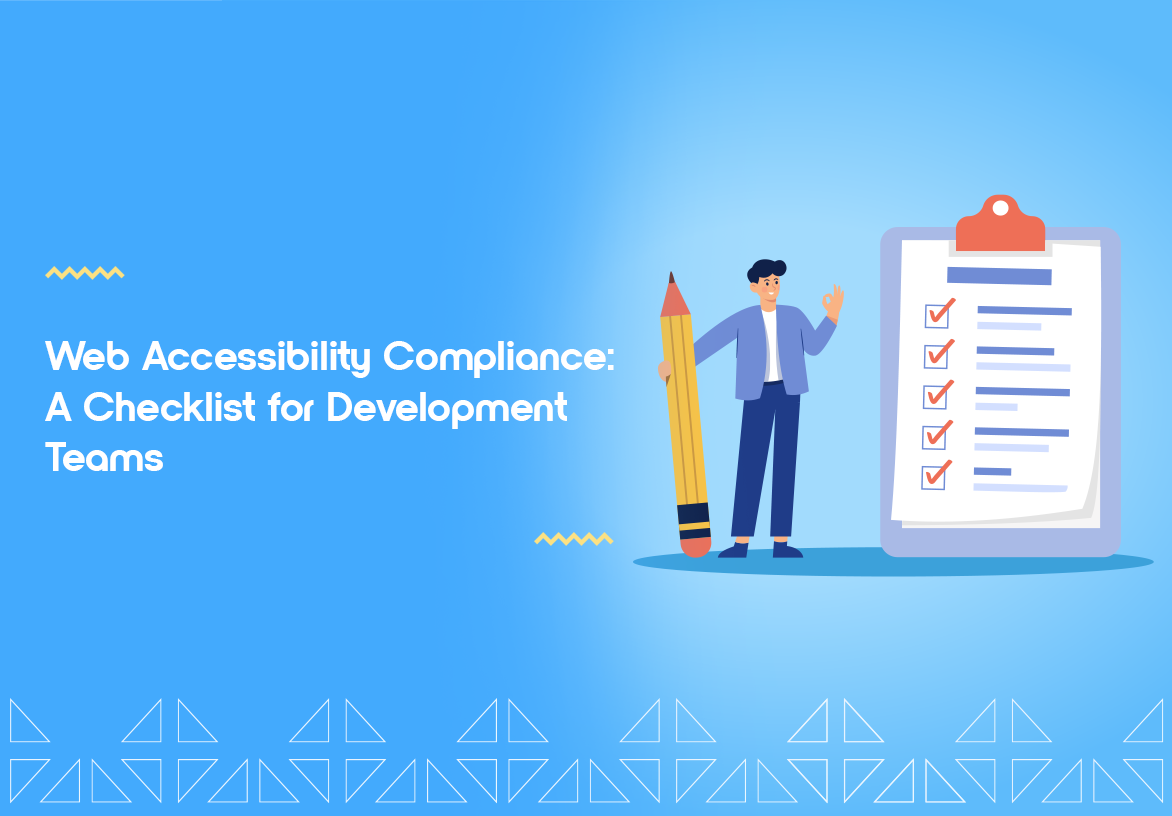Web Accessibility Compliance: A Checklist for Development Teams
Enhance your website's inclusivity & accessibility with Zcoderz's guide to understanding & implementing web accessibility guidelines effectively
Web Accessibility Compliance: A Checklist for Development Teams
In the contemporary era, web accessibility stands as a crucial component of the broader social engagement movement. It revolves around ensuring that information is readily available, eliminating digital obstacles, and bolstering productivity. Beyond these immediate benefits, enhancing web accessibility also serves to expand the audience and elevate the ranking of websites. Undoubtedly, adherence to web accessibility guidelines in this era emerges as a foundational pillar fostering inclusivity and accessibility within the online sphere, thereby fostering economic activation and job creation among other positive outcomes. Comprehensive understanding of these guidelines is crucial.
What Constitutes Compliance?
Compliance denotes the alignment of a website or social media features with functional and technical guidelines. These specifications may be specific to certain countries or established by organizations like the Web Accessibility Initiative (WAI). A compliant website must incorporate tools and features ensuring accessibility for all users, irrespective of their technical proficiency or physical abilities.
Understanding Web Accessibility Compliance Guidelines
It's essential to recognize that web accessibility guidelines facilitate universal access to knowledge and information, reducing inequalities and enhancing fairness in both personal and professional development opportunities. Moreover, these guidelines foster social inclusion and encourage active participation in the information society.
The Imperative of Web Accessibility Compliance
Web accessibility is a potent instrument in the ongoing battle to bridge the digital divide in the 21st century. Hence, proactive promotion of web accessibility becomes imperative, necessitating the formulation of organizational strategies and public policies to facilitate universal connectivity through information and communication technologies. Furthermore, it plays a pivotal role in the technological and cultural advancement of society in the short and long term, driving innovation and bolstering brand reputation.
Guidelines for Web Accessibility Compliance
Compliance with web accessibility standards is contingent upon adhering to a set of guidelines, laws, and standards aimed at enhancing digital accessibility. Below, we outline various web accessibility guidelines and legal provisions to elucidate their implications and compliance measures.
Americans with Disabilities Act (ADA)
The ADA, a comprehensive civil rights law, safeguards individuals with disabilities from online discrimination by mandating accessibility features. While the ADA lacks explicit guidelines for website compliance, adherence to WCAG 2.1 guidelines is necessary to mitigate legal repercussions.
Who Must Comply: All federal agencies based in the United States, including international branches.
Penalty: Violations may lead to legal repercussions and brand damage.
Web Content Accessibility Guidelines (WCAG)
WCAG delineates standards for online content accessibility, ensuring universal access. Evolving through iterations, WCAG 2.1 stands as the current benchmark for digital accessibility.
Who Must Comply: Public administrations worldwide, along with affiliated organizations, are mandated to ensure web accessibility.
Penalty: Non-compliance may result in monetary penalties.
Section 508
Under the Rehabilitation Act of 1973, Section 508 directs federal agencies to ensure accessibility across various digital platforms, aligning with WCAG 2.1 guidelines.
Who Must Comply: All federal agencies, including international branches, are obligated to ensure digital accessibility.
Penalty: Non-compliance may lead to financial penalties and reputational damage.
Ontario Canadian Disability Accessibility Act 2005 (AODA)
AODA outlines web accessibility guidelines aimed at fostering inclusivity and eliminating barriers to access.
Who Must Comply: Public, private, and non-governmental organizations operating in Ontario are mandated to ensure web accessibility.
Penalty: Non-compliance may result in significant fines.
Health Insurance Portability and Accountability Act (HIPAA)
HIPAA mandates stringent standards for protecting healthcare-related information, ensuring data security and privacy.
Who Must Comply: Health insurance companies, healthcare providers, and related entities must adhere to HIPAA regulations.
Penalty: Non-compliance may incur substantial fines.
General Data Protection Regulation (GDPR)
GDPR safeguards individual data privacy within the European Union, imposing stringent regulations on data handling practices.
Who Must Comply: Organizations processing EU citizen data must adhere to GDPR provisions.
Penalty: Violations may lead to substantial fines.
Children's Online Privacy Protection Act (COPPA)
COPPA regulates the collection of personal data from children under 13, mandating parental consent for data collection.
Who Must Comply: Websites collecting data from users under 13, including those targeting US citizens, must adhere to COPPA regulations.
Penalty: Non-compliance may result in significant fines.
Family Educational Rights and Privacy Act (FERPA)
FERPA mandates web accessibility guidelines concerning academic records, ensuring accessibility for all stakeholders.
Who Must Comply: Educational institutions funded by the US government must adhere to FERPA regulations.
Penalty: Non-compliance may incur financial penalties.
Authoring Tool Accessibility Guidelines (ATAG)
ATAG outlines standards for authoring tools to facilitate the creation of accessible content, complementing WCAG guidelines.
Who Must Comply: All websites utilizing authoring tools are encouraged to adhere to ATAG guidelines.
Penalty: Non-compliance may result in accessibility barriers.
Video Communications and Accessibility Act (CVAA)
CVAA ensures accessibility of video content and communication services, catering to individuals with disabilities.
Who Must Comply: Websites offering video services and content distributors must adhere to CVAA regulations.
Penalty: Non-compliance may result in substantial fines.
EN301549
EN301549 sets accessibility requirements for ICT products and services in public procurement, ensuring accessibility for all.
Who Must Comply: Entities across the European Union must adhere to EN301549 regulations.
Penalty: Non-compliance may lead to legal action and financial penalties.
In Conclusion
Adhering to web accessibility guidelines is paramount to fostering universal access to content, thereby reducing barriers, and promoting inclusivity. Compliance with these guidelines ensures that content is accessible to individuals of all abilities, fostering a more equitable online environment.

